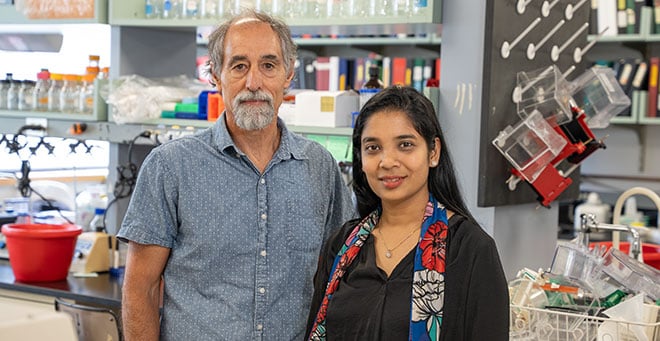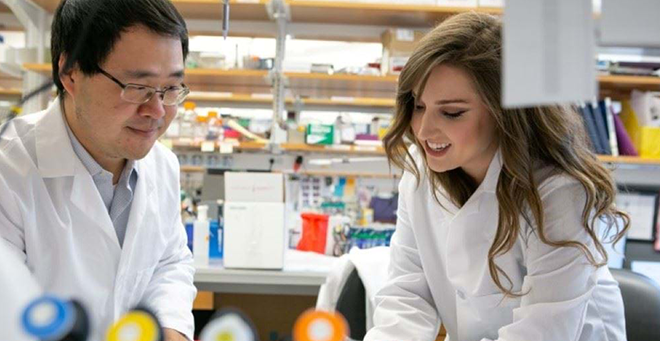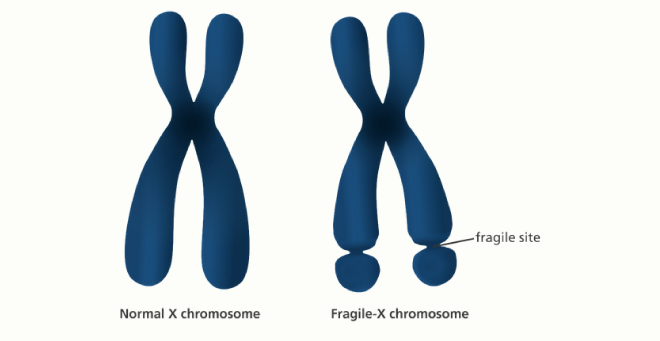
STAT News has selected three research teams from UMass Chan Medical School to compete in its 2024 STAT Madness competition. Members of the public are invited to vote for the best biomedical research from 2023. The first round of voting, which will narrow the field from 64 to 32, has begun.
Selected for the bracket-style competition in which readers vote on the most important and impactful research are separate studies co-lead by Wen Xue, PhD, associate professor of RNA therapeutics; Elinor Karlsson, PhD, the Dr. Eileen L. Berman and Stanley I. Berman Foundation Chair in Biomedical Research and associate professor of molecular medicine; and Joel D. Richter, PhD, the Arthur F. Koskinas Chair in Neuroscience and professor of molecular medicine.

Working with researchers from around the world, Dr. Karlsson, who is also director of the Vertebrate Genomics Group at the Broad Institute of the Massachusetts Institute of Technology and Harvard University, co-led the Zoonomia Project, which pinpoints key parts of the human genome unchanged after millions of years by comparing the genomes of 240 mammals. Published by the Proceedings of the National Academies of Science on April 28, 2023, the paper was part of a special feature in PNAS on the Earth BioGenome Project, a global effort to map the genomes of all plants, animals, fungi and other microbial life on Earth.
In the study, Karlsson estimated that more than 10 percent of the human genome is virtually unchanged across mammalian species and millions of years of evolution, indicating these sequences have important functions. By comparing hibernating and non-hibernating animals, the scientists identified genes involved in mitochondrial disorders, protection against heat stress and longevity, and they found that changes in seemingly unimportant, non-protein-coding parts of our genome influence brain size and learning.
Using comparative genomics, Karlsson and colleagues shed light on how certain species achieve extraordinary feats, and understanding the human genome and how parts of it might influence health and disease.
A UMass Chan team co-led by Dr. Xue screened more than 700 lipids to identify an ideal lipid nanoparticle to deliver mRNA and CRISPR components into lung tissue. Published in Nature Biotechnology on March 30, 2023, Xue and colleagues showed in mice that they could effectively edit genes in the two main types of lung airway epithelial cells, the primary targets for congenital lung diseases, including cystic fibrosis.
The authors say this is an important step toward delivering inhalable gene therapies through a nebulizer.

An antisense therapy developed by Drs. Richter, Sneha Shan, PhD, assistant professor of molecular medicine and Jonathan K. Watts, PhD, professor of RNA therapeutics at UMass Chan restores production of the protein FMRP in cell samples taken from patients with fragile X syndrome. Published on June 26 in the Proceedings of the National Academy of Sciences, this breakthrough was possible because of the novel findings, also presented in the study, that aberrant alternative splicing of messenger RNA (mRNA) plays a principal role in fragile X syndrome, the most common form of inherited intellectual disability and the most frequent single-gene cause of autism.
Richter said the discovery “offers real hope that a therapy to mitigate fragile X syndrome may be possible and could be translated to the clinic sooner than we once thought.”
Members of the public are encouraged to vote for their favorite research teams. The winning research team will be named in early April after six rounds of voting. Follow our coverage of the competition on X (formerly Twitter), Facebook and LinkedIn.


